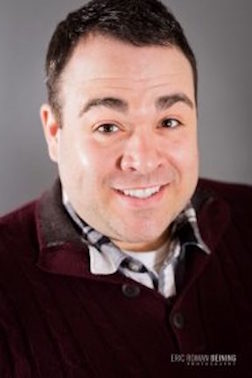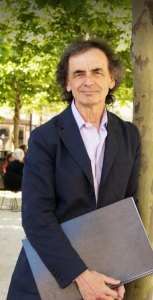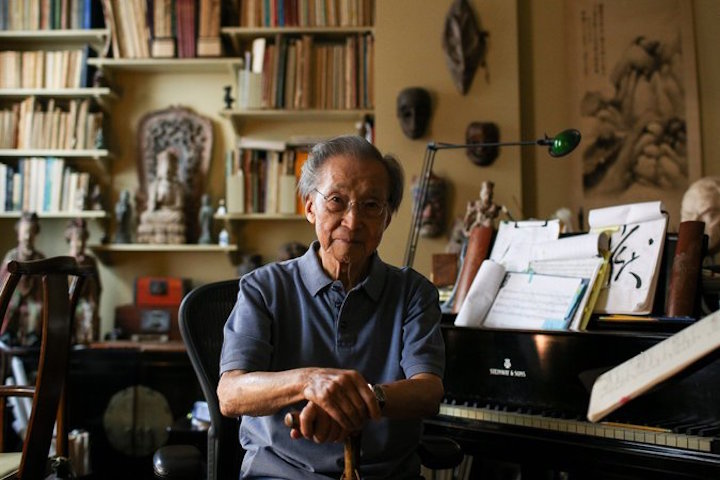The Well-Tempered Ear
Cellist Camille Thomas makes her Madison debut online from Paris for the Wisconsin Union Theater this Saturday night
Leave a Comment
PLEASE HELP THE EAR. IF YOU LIKE A CERTAIN BLOG POST, SPREAD THE WORD. FORWARD A LINK TO IT OR, SHARE IT or TAG IT (not just “Like” it) ON FACEBOOK. Performers can use the extra exposure to draw potential audience members to an event. And you might even attract new readers and subscribers to the blog.
By Jacob Stockinger
The Wisconsin Union Theater’s fall virtual Concert Series performances will begin this Saturday night, Nov. 7, at 7:30 p.m. CST with a live online performance from Paris by the acclaimed cellist Camille Thomas (below).
The “Midnight in Paris” recital – performed in Paris and streamed — features music by Claude Debussy, Nadia Boulanger, Maurice Ravel and Frederic Chopin. The performance will be preceded by a live 30-40 minute online Q&A with Thomas and pianist Julien Brocal on Saturday afternoon at 2 p.m. CST.
Here are the specific works on the program, which will last about 75 minutes with no intermission:
Debussy, “Clair de Lune” (arr. Roelens)
Nadia Boulanger, “Three Pieces” for cello and piano
Ravel, Kaddish
Chopin, Cello Sonata in G Minor, Op. 65; and Introduction et Polonaise brillante, Op. 3
Tickets for this online event are $10 for UW-Madison students, $18 for Wisconsin Union members, and $20 for all other patrons.
For more information about the Thomas’ performance – including a video and how to purchase tickets — visit union.wisc.edu/events-and-activities/event-calendar/event/camille-thomas.
Thomas (below), a Franco-Belgian cellist, says she uses her music to bring people together from a range of cultures and backgrounds. Thomas released her second album, called “Voice of Hope,” with the exclusive Deutsche Grammophon this past June. (In the YouTube video at the bottom, you can hear Thomas play a solo version from the album of Gluck’s “Dance of the Blessed Spirits” from his opera “Orfeo ed Euridice.”)
Thomas plays the Feuermann Stradivarius cello (1730, below) — named for the famous 20th-century cellist Emanuel Feuermann who played it — with a bow by Eugene Sartory, who is regarded as one of the finest bow makers in history. Joining her for this performance will be pianist Julien Brocal.
“Camille Thomas’s extraordinary talent makes her one of the most captivating artists of our time, as evidenced by being the first cellist in several decades to be signed by the major record label Deutsche Grammophon,” says Wisconsin Union Theater director Elizabeth Snodgrass. “Her ‘Midnight in Paris’ program brings us closer to her roots and reflects the beauty and charm of her personality as well as her musicality.”
The Ear has listened to some of Thomas’ performances on YouTube and finds her tone, intonation and phrasing outstanding.
The performance by Camille Thomas is the start of the fall Concert Series events, which includes a concert with pianist Jeremy Denk (below, in a photo by Hiroyuki Ito for The New York Times) on Friday, Dec. 11.
In its 101st year, the Wisconsin Union Theater’s Concert Series is one of the oldest uninterrupted series of its kind in the United States.
The Wisconsin Union Theater (WUT) has served as a cultural center for community members and visitors for more than 75 years. The WUD Performing Arts Committee plans many of the Theater’s events, including the Concert Series.
While usually held in-person and most often in Shannon Hall, the Wisconsin Union Theater team will hold this fall’s theater events in a virtual format for the health and safety of patrons, artists and team members in light of the COVID-19 pandemic.
The team aims for all of its spaces, including online ones, to be accessible. Those that need accommodations can reach out to the Wisconsin Union Theater team at wisconsinuniontheater@union.wisc.edu.
The WUT team says it continues to evaluate what changes may need to occur related to the spring Concert Series events as well as other spring Theater season performances.
The Wisconsin Union Theater has made multiple commitments to take a stand against racial injustice, including being more than allies, being activists; using the arts to create social justice; remembering students are future leaders and must be part of the change; using its voice to influence leadership and being firm in its resolve; and making space, stepping back and learning how to give up undeserved or unnecessary power and privilege.
Tags: #BaroqueMusic, #BaroqueOpera, #BerlinGermany, #BlogPost, #BlogPosting, #CamilleThomas, #CelloBow, #CelloSonata, #CentralStandardTime, #ChamberMusic, #ChristophWillibaldGluck, #Clairdelune, #ClaudeDebussy, #CommunityMembers, #ConcertSeries, #CoronavirusPandemic, #COVID-19, #CulturalCenter, #DanceoftheBlessedSpirits, #DeutscheGrammophon, #ElizabethSnodgrass, #EmanuelFeuermann, #EugeneSartory, #FacebookPost, #FacebookPosting, #FacultyMember, #Franco-Belgian, #FredericChopin, #Fridaynight, #HiroyukiIto, #JacobStockinger, #JeremyDenk, #JulienBrocal, #LiveMusic, #MauriceRavel, #MidnightinParis, #Musicfaculty, #NadiaBoulanger, #NewYorkTimes, #OnlineConcert, #OrfeoedEuridice, #ParisFrance, #PianoAccompanist, #PublicHealth, #RacialInjustice, #RecordedMusic, #RecordLabel, #SaturdayAfternoon, #ShannonHall, #SocialJustice, #StradivariusCello, #TeamMembers, #TheEar, #TheU.S., #TheUS, #TheUW, #UnitedStates, #UniversityofWisconsin, #UniversityofWisconsin-Madison, #VirtualConcert, #VoiceofHope, #WisconsinUnionTheater, #YouTubevideo, accessible, accommodation, accompany, accuracy, activist, afternoon, Album, Allies, arrnagement, artist, artists, Arts, audience, background, Baroque, Baroque music, beauty, Belgian, Belgium, Berlin, blessed, blog, Boulanger, bow, Camille Thomas, captivating, CD, cellist, Cello, cello bow, Cello Sonata, center, Central Standard Time, Chamber music, change, changes, charm, Chopin, Christoph Willibald Gluck, Clair de Lune, Classical music, Claude Debussy, commitments, community, composer, Concert, concert hall, concert series, coronavirus, CST, cultural, cultural center, culture, dance, Dance of the Blessed Spirits, Debussy, decades, Denk, Deutsche Grammophon, DG, director, Early music, Elizabeth Snodgrass, Eugene Sartory, Eurydice, evaluate, event, exclusive, extraordinary, Facebook, faculty, fall, finest, firm, forward, France, Franco-Belgium, Frédéric Chopin, French, Friday, future, German, Germany, Gluck, Health, Hiroyuki Ito, History, hope, in person, influence, information, injustice, intermission, intonation, introduction, Ito, Jacob Stockinger, Jeremy Denk, join, Julien Brocal, June, Kaddish, kind, leaders, leadership, learn, light, like, link, listen, live, live music, Luthier, Madison, major, Maurice Ravel, members, midnight, Midnight in Paris, minute, multiple, Music, musicality, Nadia Boulanger, need, New York Times, night, oldest, online, Op., opera, opus, Orfeo ed Euridice, Orpheus, outstanding, pandemic, Paris, patrons, People, perform, performaer, performance, performer, personality, photo, phrasing, Pianist, Piano, Piano accompanist, polonaise, post, posting, power, precede, privilege, program, public, Public health, purchase, Q&A, question-and-answer, race, racial injustice, racism, range, Ravel, reader, recital, Record label, recorded music, reflects, regard, resolve, roots, safety, Saturday, Shannon Hall, share, sign, social justice, solo, Sonata, spaces, specific, spirit, Spring, start, Strad, Stradivarius, stream, Student, students, subscriber, tag, talent, team, team members, The Ear, tickets, time, together, tone, U.S., undeserved, uninterrupted, United States, University of Wisconsin, University of Wisconsin–Madison, unnecessary, US, use, UW, UW-Madison, version, virtual, visitors, voice, Voice of Hope, Wisconsin, Wisconsin Union Theater, work, years, YouTube
Classical music: The Oakwood Chamber Players perform a mini-opera version of “A Christmas Carol” this Saturday night and Sunday afternoon
1 Comment
PLEASE HELP THE EAR. IF YOU LIKE A CERTAIN BLOG POST, SPREAD THE WORD. FORWARD A LINK TO IT OR, SHARE IT or TAG IT (not just “Like” it) ON FACEBOOK. Performers can use the extra exposure to draw potential audience members to an event. And you might even attract new readers and subscribers to the blog.
By Jacob Stockinger
Over several deuces, the Oakwood Chamber Players have built a solid reputation for their top-notch performances of unusual and neglected repertoire.
So it comes as no surprise that the group will offer one of the newer, more unusual and promising takes on the holiday classic, “A Christmas Carol.”
Twice this weekend, the Madison-based, widely experienced musical theater actor and baritone Robert A. Goderich reprises his tour-de-force performance, last done in 2016, of Charles Dickens’ characters for the Oakwood Chamber Players’ presentation of the mini-opera “The Passion of Scrooge” by New York composer Jon Deak.
A dozen musicians, including ensemble members with special guest artists, provide the platform for Goderich’s characterizations on this coming Saturday night, Dec. 7, at 7 p.m., and Sunday afternoon, Dec. 8, at 2 p.m.
The concerts take place at Oakwood Village University Woods Auditorium at 6209 Mineral Point Road, on Madison’s far west side near West Towne Mall.
Tickets are available at the door and are $25 for adults, $20 for seniors, and $5 for students. Go to https://www.oakwoodchamberplayers.com for more information.
Members of the ensemble for this program are: Marilyn Chohaney (flute), Nancy Mackenzie (clarinet), Anne Aley (horn), Elspeth Stalter Clouse (violin) and Maggie Darby Townsend (cello), and guest musicians Hillary Hempel (violin), Emma Cifrino (viola), Brad Townsend (bass), Mike Koszewski (percussion), and Margaret Mackenzie (harp).
Over the past two decades, New York Philharmonic bassist and composer Jon Deak (below) has created a variety of “concert dramas” that tell stories through words and sound.
Performed annually at the Smithsonian, this two-act musical setting re-imagines Ebenezer Scrooge’s struggle to transform his past, present and future from a life of avarice to warmth and humanity.
As singer and narrator, Goderich, who plays all the parts, is the focal point; but the composer has given the instrumentalists an integral part in the story line, too. Conductor Kyle Knox (below) leads the ensemble through many facets of this humorous work filled with dramatic effects.
Deak requires the musicians to be nimble performers, juggling melodic lines while interjecting entertaining sounds into Dickens’ traditional tale. You can hear the opening introduction by the Storyteller in the YouTube video at the bottom.
One of the score’s important aspects is the varied use of percussion, which provides a broad range of instruments and sound effects. Audiences can enjoy both the aural and visual artistry of chains rattling, doors creaking and footsteps echoing in this holiday classic.
Additionally, the Oakwood Chamber Players will perform a suite of British reels and carols, including songs mentioned in the text of Dickens’ original story.
For example, when the Ghost of Christmas Past reminds Scrooge of his first employer Fezziwig, a fiddler plays the tune “Sir Roger De Coverley.” This Scottish-English country dance, arranged by composer Frank Bridge in 1922, is one of the tunes providing an engaging introduction to “The Passion of Scrooge.”
Tags: #AChristmasCarol, #AnneAley, #BaritoneSinger, #BlogPost, #BlogPosting, #ChamberMusic, #ChamberOpera, #CharlesDickens, #CountryDance, #DoubleBass, #DoubleBassist, #EbenezerScrooge, #FacebookPost, #FacebookPosting, #FocalPoint, #FrankBridge, #GhostofChristmasPast, #GuestArtist, #HilaryHahn'sViolincase, #HolidayClassic, #HomeWebpage, #InstrumentalMusic, #InstrumentalPlayer, #JonDeak, #KyleKnox, #MargaretMackenzie, #MarilynChohaney, #MelodicLine, #MikeKoszewski, #MusicalTheater, #NeglectedMusic, #NeglectedRepertoire, #NewMusic, #NewYorkCity, #NewYorkPhilharmonic, #OakwoodChamberPlayers, #OakwoodVillage, #OperaMusic, #RobertGoderich, #SeniorCitizen, #SmithsonianInstitution, #SoundEffects, #ThePassionofScrooge, #ThePasson ofScrooge, #UniversityWoods, #VocalMusic, #WestSide, #WestTowneMall, #YouTubevideo, A Christmas Carol, acclaim, Actor, adult, Anne Aley, annual, artistry, Arts, audience, aural, avarice, baritone, bass, bassist, blog, British, broad, Carol, Cello, chains, Chamber music, chamber opera, character, Charles Dickens, Christmas, clarinet, clarinetist, classic, Classical music, composer, Concert, conductor, country, country dance, creaking, dance, decades, double bass, double bassist, drama, dramatic, echo, echoing, employer, English, enjoy, ensemble, entertain, entertaining, Facebook, fiddler, flute, flutist, focal point, footsteps, forward, Frank Bridge, future, ghost, Ghost of Christmas Past, guest artist, harp, harpist, Holiday, holiday classic, Horn, hornist, humanity, humorous, instrumental music, instrumental player, instrumentalist, Jacob Stockinger, Jon Deak, juggle, Kyle Knox, life, like, link, Madison, Margaret Mackenzie, Marilyn Chohaney, melodic, melody, Mike Koszewski, Music, Musical theater, musicians, narrator, neglected, new, New Music, New York City, New York Philharmonic, nimble, Oakwood Chamber Players, Oakwood Village, online, opera, opera music, past, percussion, percussionist, performer, player, post, posting, present, presentation, promising, range, reels, repertoire, repetoire, reputation, Robert Goderich, Scottish, Scrooge, senior, senior citizen, setting, share, singer, Smithsonian, Smithsonian Institution, solid, song, songs, Sound, sound effects, standard, story, struggle, Student, Suite, surprise, tag, tale, text, The Passion of Scrooge, ticket, traditional, transform, tune, tunes, United States, University of Wisconsin-Madison School of Music, University of Wisconsin–Madison, University Woods, unusual, Viola, Violin, violinist, violist, visual, vocal music, Website, weekend, west side, West Towne Mall, Wisconsin, words, YouTube
Classical music: Meet UW-Madison bassoonist Marc Vallon who performs with the Willy Street Chamber Players on Friday night
2 Comments
IF YOU LIKE A CERTAIN BLOG POST, PLEASE SPREAD THE WORD. FORWARD A LINK TO IT OR, SHARE IT or TAG IT (not just “Like” it) ON FACEBOOK. Performers can use the extra exposure to draw potential audience members to an event. And you might even attract new readers and subscribers to the blog.
By Jacob Stockinger
Who is Marc Vallon (below, in a photo by James Gill)?
This week, he is the bassoonist who will perform Franz Danzi’s Quartet for Bassoon and Strings in D minor, Op. 40, No. 2 (ca. 1820), this coming Friday night, July 19, with the acclaimed Willy Street Chamber Players (below), who will also be joined by pianist Jason Kutz and violist Sharon Tenhundfeld..
(The concert is at 6 p.m. in Immanuel Lutheran Church, 1021 Spaight Street. The program includes: the Allegretto for Piano Trio by Ludwig van Beethoven (1812); “Dark Wood” by American composer Jennifer Higdon (2001); and the rarely heard String Quartet No. 1 (1948) by Argentinean composer Alberto Ginastera. Admission is $15.)
A native of France, Vallon is one of the busiest musicians in Madison. He teaches at the University of Wisconsin-Madison’s Mead Witter School of Music, where he also performs individually, with faculty and student colleagues, and as a member of the Wingra Wind Quintet. He also frequently performs and conducts Baroque music with the Madison Bach Musicians.
Vallon attended the Paris Conservatory, where he won first prizes in bassoon and chamber music, and also earned a philosopher degree at the Sorbonne or University of Paris.
A versatile musician, Vallon played with famed avant-garde French composer Pierre Boulez and for more than 20 years was the principal bassoon of the well-known Amsterdam Baroque Orchestra. He has also performed with major modern orchestras and conductors as well as with many period-instrument groups.
He gives master classes worldwide and also composes.
For a more extended and detailed biography, go to: https://www.music.wisc.edu/faculty/marc-vallon/
Vallon recently did an email Q&A interview with The Ear:
What drew you to the bassoon (below) over, say, the piano or singing, over strings, brass or other woodwinds?
I played the piano as young kid but was not very interested in the mechanics of it, even if I had a strong passion for music. It was the day that my piano teacher brought to my lesson a friend of his to do a bassoon demo that I found the right medium for my passion.
I started practicing like a maniac and knew by the age of 14 that I was going to be a professional bassoonist.
What would you like the public to know about the bassoon, perhaps about the challenges of playing it and about the repertoire for it?
The bassoon does not offer more challenges than other wind instruments, but it is safe to say that an absolute perfectionist person should probably not play it.
It is an instrument capable of true beauties, yet it has its own character. You don’t conquer it, you work with it like you would work with a wonderful but temperamental colleague.
Bassoonists sometimes complain that our solo repertoire is not as rich in masterpieces as the clarinet’s or the flute’s. True, but in its 350 years of existence, the bassoon has amassed enough wonderful music to keep us busy for several lifetimes.
What would you like to tell the public about the specific Bassoon Quartet by Franz Danzi that you will perform, and about Danzi and his music in general?
The bassoon and strings quartet became popular in the last decades of the 18th century, a trend that lasted well into the Romantic era.
Sadly, many of these quartets are basically show-off pieces for the bassoonist while the strings players have to suffer through some often very dull accompaniment parts.
I like this one by Danzi (below) because it features the strings on the same musical level as the bassoon, creating an enjoyable musical conversation rather than a cocky bassoon monologue. (You can hear that musical conversation in the opening movement of the Bassoon Quartet by Danzi in the YouTube video at the bottom.)
As a performer and conductor, you are well–known for championing baroque music as well as modern and contemporary music. Do you have a preference? Do they feed each other in your experience?
What I always have enjoyed about playing contemporary music is the possibility to work with living composers because I often realized how flexible they are with their own music and how much they like the performer’s input. They’re often ready to compromise and veer away from the strict notation.
The approach when playing composers from the past is actually very similar in the sense that we have to remember how approximate music notation is. Baroque composers are not here anymore obviously, but the 17th and 18th centuries sources tell us clearly how much flexibility we, modern performers, have in our approach to their music.
When it comes to music pre-1800, we basically have a sketch on our music stands. I always want to remember this. (Below is a manuscript page of a cantata by Johann Sebastian Bach.)
Do you have big projects coming up next season?
Always! I am putting together a contemporary program on March 27 in our new concert hall on campus. It is called ”Opening Statements” and will feature early works from major 20th-century composers.
On period instruments, I have Bach’s “Christmas Oratorio,” Mendelssohn’s “Elijah” and more Bach on my calendar.
Is there something else you would like to say?
A big Thank You to you, Jake, for being such a relentless and informed advocate of the Madison musical scene!
Tags: #17thCentury, #18thCentury, #19thCentury, #20thCentury, #AcademicCalendar, #AlbertoGinastera, #AmsterdamBaroqueOrchestra, #ArgentineanComposer, #BaroqueChamberMusic, #BaroqueMusic, #BassoonMusic, #BassoonQuartet, #BlogInterview, #BlogPost, #BlogPosting, #BrassMusic, #ChamberMusic, #ChoralMusic, #ChristianChurch, #ChristmasOratorio, #ClarinetMusic, #ConcertHall, #ContemporaryComposers, #ContemporaryMusic, #DarkWood, #EventsCalendar, #FacebookPost, #FacebookPosting, #FacultyMember, #FelixMendelssohn, #FirstPrize, #FluteMusic, #FranzDanzi, #Fridaynight, #HistoricallyInformedPerformancePractices, #ImmanuelLutheranChurch, #JasonKutz, #JenniferHigdon, #JohannSebastianBach, #LivingComposers, #LudwigVanBeethoven, #MadisonBachMusicians, #MarcVallon, #MeadWitterSchoolofMusic, #ModernMusic, #Musicfaculty, #MusicNotation, #OpeningStatement, #ParisConservatory, #PeriodInstrument, #PIanoTeacher, #PianoTrio, #PierreBoulez, #PopularMusic, #PracticingMusic, #PrincipalBassoon, #ProfessionalMusician, #RomanticEra, #RomanticMusic, #RomanticPeriod, #StringMusic, #StringQuartet, #ThankYou, #TheEar, #TheSorbonne, #UniversityofParis, #UniversityofWisconsin-Madison, #WillyStreetChamberPlayers, #WingraWindQuintet, #YouTubevideo, 17th century, 18th century, 19th century, 20th-century, 20th-century music, accompaniment, admission, advocate, age, Alberto Ginastera, always, Amsterdam Baroque Orchestra, approach, approximate, Argentina, Argentinean, Arts, audience, away, Bach, Baroque, Baroque music, Bassoon, bassoonist, beauties, beauty, Beethoven, biography, blog, brass, calendar, Campus, Cello, challenge, challenges, Chamber music, champion, choral music, Christian, Christmas Oratorio, church, clarinet, Classical music, classicalmusic, cocky, colleague, composer, compromise, Concert, concert hall, conduct, conductor, conquer, contemporary composer, contemporary music, conversation, dark, Dark Wood, decades, degree, demo, dull, early, Early music, Elijah, email, era, existence, Facebook, faculty, Felix Mendelssohn, first prize, flexible, flute, France, Franz Danzi, French, Friday, friend, historically informed performance practices, Immanuel Lutheran Church, informed, input, instrument, interview, Jacob Stockinger, Jazon Kutz, Jennifer Higdon, Johann Sebastian Bach, kid, knew, know, level, lifetime, like, link, living composers, Ludwig van Beethoven, Madison, Madison Bach Musicians, major, maniac, manuscript, Marc Vallon, masterpiece, Mead Witter School of Music, mechanics, medium, member, modern, modern music, monologue, Music, music notation, new, night, notation, opening statement, oratorio, Orchestra, page, Paris, Paris Conservatory, Passion, perfectionist, perform, performer, period instruments, person, philosophy, Pianist, Piano, piano teacher, Piano Trio, Pierre Boulez, play, popular, practicing, prinicipal, professional, professor, program, project, Q&A, reader, relentless, repertoire, right, Romantic, Romantic era, safe, same, say, share, Sharon Tenhundfeld, show-off, Singing, sketch, solo, Sorbonne, sources, spread, strict, string, String quartet, strings, Student, subscriber, suffer, symphony, tag, Teacher, temperamental, thank you, The Ear, trend, trio, true, United States, university, University of Paris, University of Wisconsin-Madison School of Music, University of Wisconsin–Madison, UW-Madison, veer, versatile, Viola, Violin, violinist, violist, way, week, Willy Street Chamber Players, Wingra Wind Quintet, Wisconsin, wonderful, wood, woodwind, word, work, young, YouTube
Classical music: Want to know about Chinese classical music composers in our time? Read this story about the six-day Juilliard festival that starts today
1 Comment
By Jacob Stockinger
Classical music – like everything else in China – has undergone momentous changes over the past few decades.
The importance of Western classical music in contemporary China is not seen only through the construction of new conservatories and opera houses; or through the many outstanding instrumentalists, especially pianists such as Lang Lang, Yundi Li, Haochen Zhang and Sa Chen, who have won prizes in Western competitions and become major performers.
Chinese composers have also left their mark, as the Juilliard School in New York City will prove over six days, starting today, during this year’s “Focus” festival.
One such older composer is Chou Wen Chung (below, in a photo by Andrew Reneissen for The New York Times).
A much younger composer is Chen Lin (below in a photo by Dawes Li).
You will find some but not a lot of their music on YouTube – yet.
But The Ear bets that many of the 33 Juilliard performances will soon find their way to social media.
Anyway, here is a link to the comprehensive preview in The New York Times, which also features some sound and video samples.
https://www.nytimes.com/2018/01/12/arts/music/juilliard-china-music.html
Tags: Arts, Bach, Baroque, Beethoven, change, Chen LIn, China, Chinese composers, Chinese music, Chou Wen Chung, Competition, composer, comprehensive, conservatory, contemporary, decade, decades, festival, Focus, Haochen Zhang, importance, instrumentalist, Jacob Stockinger, Juilliard School, Lang Lang, Madison, media, momentous, Music, New Music, New York City, New York Times, old, older, opera, Opera house, performer, Piano, preview, Sa Chen, sample, social, social media, Sound, symphony, United States, University of Wisconsin-Madison School of Music, University of Wisconsin–Madison, video, Western, YouTube, Yundi Li
- May 2024
- April 2024
- March 2024
- February 2024
- January 2024
- December 2023
- November 2023
- October 2023
- September 2023
- August 2023
- July 2023
- June 2023
- May 2023
- April 2023
- March 2023
- February 2023
- January 2023
- December 2022
- October 2022
- September 2022
- June 2022
- May 2022
- April 2022
- March 2022
- July 2021
- June 2021
- May 2021
- April 2021
- March 2021
- February 2021
- January 2021
- December 2020
- November 2020
- October 2020
- September 2020
- August 2020
- July 2020
- June 2020
- May 2020
- April 2020
- March 2020
- February 2020
- January 2020
- December 2019
- November 2019
- October 2019
- September 2019
- August 2019
- July 2019
- June 2019
- May 2019
- April 2019
- March 2019
- February 2019
- January 2019
- December 2018
- November 2018
- October 2018
- September 2018
- August 2018
- July 2018
- June 2018
- May 2018
- April 2018
- March 2018
- February 2018
- January 2018
- December 2017
- November 2017
- October 2017
- September 2017
- August 2017
- July 2017
- June 2017
- May 2017
- April 2017
- March 2017
- February 2017
- January 2017
- December 2016
- November 2016
- October 2016
- September 2016
- August 2016
- July 2016
- June 2016
- May 2016
- April 2016
- March 2016
- February 2016
- January 2016
- December 2015
- November 2015
- October 2015
- September 2015
- August 2015
- July 2015
- June 2015
- May 2015
- April 2015
- March 2015
- February 2015
- January 2015
- December 2014
- November 2014
- October 2014
- September 2014
- August 2014
- July 2014
- June 2014
- May 2014
- April 2014
- March 2014
- February 2014
- January 2014
- December 2013
- November 2013
- October 2013
- September 2013
- August 2013
- July 2013
- June 2013
- May 2013
- April 2013
- March 2013
- February 2013
- January 2013
- December 2012
- November 2012
- October 2012
- September 2012
- August 2012
- July 2012
- June 2012
- May 2012
- April 2012
- March 2012
- February 2012
- January 2012
- December 2011
- November 2011
- October 2011
- September 2011
- August 2011
- July 2011
- June 2011
- May 2011
- April 2011
- March 2011
- February 2011
- January 2011
- December 2010
- November 2010
- October 2010
- September 2010
- August 2010
- July 2010
- June 2010
- May 2010
- April 2010
- March 2010
- February 2010
- January 2010
- December 2009
- November 2009
- October 2009
- September 2009
- August 2009
Archives
- 2,493,300 hits
Blog Stats
Recent Comments
| welltemperedear on What do you think of the… | |
| Scott on What do you think of the… | |
| welltemperedear on Yunchan Lim’s Chopin etudes ar… | |
| bratschespeilerin on What do you think of the… | |
| MARVIN P WICKENS on Yunchan Lim’s Chopin etudes ar… |
Tags
#BlogPost #BlogPosting #ChamberMusic #FacebookPost #FacebookPosting #MeadWitterSchoolofMusic #TheEar #UniversityofWisconsin-Madison #YouTubevideo Arts audience Bach Baroque Beethoven blog Cello Chamber music choral music Classical music Compact Disc composer Concert concerto conductor Early music Facebook forward Franz Schubert George Frideric Handel Jacob Stockinger Johannes Brahms Johann Sebastian Bach John DeMain like link Ludwig van Beethoven Madison Madison Opera Madison Symphony Orchestra Mead Witter School of Music Mozart Music New Music New York City NPR opera Orchestra Overture Center performer Pianist Piano post posting program share singer Sonata song soprano String quartet Student symphony tag The Ear United States University of Wisconsin-Madison School of Music University of Wisconsin–Madison Viola Violin vocal music Wisconsin Wisconsin Chamber Orchestra wisconsin public radio Wolfgang Amadeus Mozart YouTube















Classical music: The opera world is divided over accusations of sexual harassment against superstar tenor Placido Domingo. Here is how John DeMain reacted. How do you react and what do you believe?
4 Comments
IF YOU LIKE A CERTAIN BLOG POST, PLEASE SPREAD THE WORD. FORWARD A LINK TO IT OR, SHARE IT or TAG IT (not just “Like” it) ON FACEBOOK. Performers can use the extra exposure to draw potential audience members to an event. And you might even attract new readers and subscribers to the blog.
By Jacob Stockinger
By now, you have probably heard about the allegations of sexual harassment recently made anonymously against the still-active superstar Spanish tenor Placido Domingo (below), 78, who holds the record for the most opening-night appearances at the Metropolitan Opera.
What you might not have heard is how divided the opera world is over those accusations, which are now being formally and independently investigated.
Much of that division falls along lines of Europe versus the United States. The former has so far not cancelled upcoming appearances while the latter was quick to. And Domingo has been defended by famed Russian soprano Anna Netrebko (below, with Domingo).
In the wake of the #MeToo movement, sexual misconduct and sexual assault continue to be perhaps the most controversial issues amid many similar or more serious criminal allegations against conductors James Levine, Charles Dutoit and Daniele Gatti as well as many teachers and orchestra players.
Perhaps the best account of the divided reactions came in a story from The New York Times. Here it is:
https://www.nytimes.com/2019/08/18/arts/music/placido-domingo-opera-harassment.html
One sign of the difficulty in dealing with the situation can be found in the carefully worded, balanced and empathetic Facebook comment by maestro John DeMain, the music director of the Madison Symphony Orchestra and the artistic director of the Madison Opera.
DeMain has often worked with Domingo, perhaps most notably in the famous 1992 Concert for Planet Earth in Rio de Janeiro, which DeMain conducted. (You can hear Domingo singing an aria by Puccini and see DeMain conducting the orchestra in the YouTube video at the bottom.)
Says DeMain (below in a photo by Prasad): “Thinking about the Placido Domingo controversy. While I’m not in a position to take sides in this very sad situation, I would just like to say that in my many interactions with this great tenor over many decades, I personally never witnessed him do anything that was inappropriate. He was always a kind and gentle person to me and my family. I wish him and his family well through this difficult time.”
Here is a link to DeMain’s Facebook page if you would like to read comments from others or leave one of your own: https://www.facebook.com/jldemain
How do you react to the accusations?
What do you believe should happen to Domingo?
The Ear wants to hear.
Share this:
Tags: #AnnaNetrebko, #BlogPost, #BlogPosting, #CharlesDutoit, #ConcertforPlanetEarth, #CriminalBehavior, #DanielGatti, #FacebookPage, #FacebookPost, #FacebookPosting, #GiacomoPuccini, #JamesLevine, #JohnDeMain, #MadisonOpera, #MadisonSymphonyOrchestra, #MeToo, #MeToomovement, #MetropolitanOpera, #OpeningNight, #OperaMusic, #OperaWorld, #OrchestralPlayers, #PlacidoDomingo, #RiodeJaniero, #RussianArtist, #SexualAssault, #SexualHarassment, #SexualMisconduct, #SopranoSinger, #SuperstarSoprano, #SuperstarTenor, #TenorSinger, #TheEnvironment, #TheNewYorkTImes, #TheU.S., #UnitedStates, #VocalMusic, #YouTubevideo, accusation, allegation, Anna Netrebko, anonymous, appearance, aria, Arts, audience, balance, balanced, blog, Brazil, cancel, cancellation, Charles Dutoit, Classical music, comment, Concert, Concert for Planet Earth, conduct, conductor, controversial, crime, criminal, criminal behavior, criminal justice, Daniele Gatti, decades, defend, difficult, divided, Earth, empathetic, empathy, environment, environmentalism, Europe, event, Facebook, Facebook page, fame, Family, formal, gentle, Giacomo Puccini, great, hear, inappropriate, independent, interaction, investigate, investigation, issue, Jacob Stockinger, James Levine, John DeMain, kind, law, legal, Madison, Madison Opera, Madison Symphony Orchestra, Maestro, me, Me Too, Me Too movement, Metropolitan Opera, movement, Music, opening night, opera, opera world, Orchestra, page, person, personal, planet, player, Plácido Domingo, post, posting, Puccini, reaction, record, Rio de Janiero, Russian, sad, see, sexual assault, sexual harassment, sexual misconduct, side, sing, Singing, situation, soprano, Spain, Spanish, story, subscriber, superstar tenor, tenor, The New York Times, time, U.S., United States, vocal music, witness, word, worded, work, world, YouTube